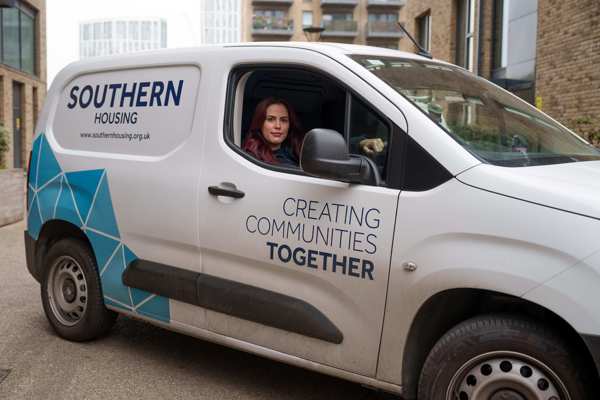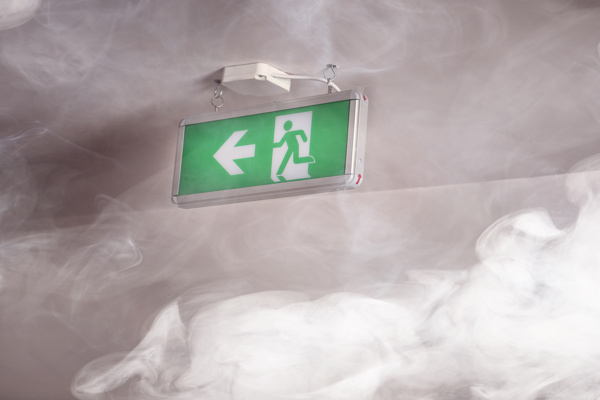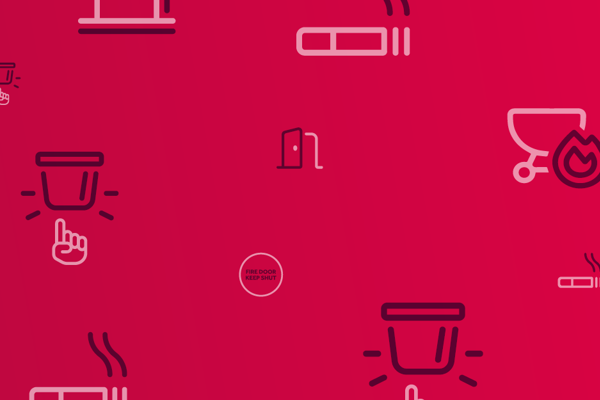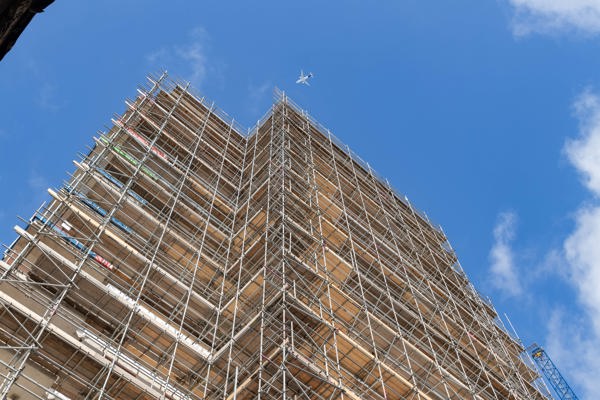We’d advise you to familiarise yourself with any fire safety information in communal areas of your block.
Should I get out or stay put?
The advice on whether to evacuate or not will depend on the building you live in.
If you live in a purpose built block of flats, there will be a fire action notice in the communal areas with the recommended approach for your building.
Further information about bungalows, houses or a flat within a converted older building can be found on the London Fire Brigade's website here.
Top tips
There are lots of things you can do to ensure you're fire safe in your home
Test your smoke alarm/s regularly, at least monthly, by pressing the test button on the alarm. If the alarm doesn’t sound, replace the battery, if it’s of the replaceable type. Or contact us immediately if you have a mains-powered alarm, or an alarm with a sealed in battery (i.e. sealed in lithium cell), so we can arrange to fix it. This is the most important thing you can do to protect yourself.
You will know when a battery needs replacing, as you will hear a single regular beep (low battery warning) coming from the alarm.
If the alarm goes off accidentally you may need to open a window to ventilate the area, however you can silence the alarm by pressing the test button on the alarm for 3-5 seconds.
If your alarm is still not working or if an alarm is missing in your home (you should have one on every floor of your home) please contact us, and we will arrange an appointment for this to be sorted.
Your local fire and rescue services may be able to provide further advice, or you can download fire safety information from www.gov.uk/firekills
If the alarms are sounding, there may be a fire present. You should evacuate the property and be absolutely sure there is no fire before returning. If in doubt, always assume there is a real fire present and take the necessary action.
Smoke makes it almost impossible to see when you're trying to escape - so plan how you’d escape if a fire did break out, and then practice it with your family.
Make sure everyone knows the escape plan.
Keep keys near doors and windows so it’s quicker to get out (for security reasons, don’t keep them within reach from outside.)
Contact usTesting your carbon monoxide alarms regularly by pressing the test button each month is important for your safety. If, during testing, the alarm doesn’t sound, replace the battery if it’s of the replaceable type. Or contact us immediately if you have a mains-powered alarm, or an alarm with a sealed in battery, so we can arrange to fix it. This is the most important thing you can do to protect yourself from carbon monoxide poisoning.
You should have a carbon monoxide alarm in each room of your home that has a fixed combustion appliance.
A ‘fixed combustion appliance’ is defined as including fixed apparatus where fuel of any type (such as gas, oil, coal, wood) is burned to generate heat. This includes gas or oil boilers, and log-burning stoves. This does not include gas cookers.
If the alarm is not working, please contact us and we will arrange an appointment to have it fixed.
If your CO alarm is sounding, open any doors or windows and if possible, turn off your gas and other combustible appliances. Leave your property and call the gas safe emergency helpline (0800 111 999) for further assistance. Please do not re-enter the property until the alarm has stopped.
Contact us
Never use a BBQ indoors or on a balcony.
This includes any temporary outdoor shelter including tents, marquees, yurts, gazebos and playhouses.
In July 2023, a fire occurred at one of our buildings in Croydon due to a barbecue on a balcony.
Remember:
- Always use your BBQ in accordance with the operating instructions
- Check your BBQ for damage before use. Never use a faulty, defective BBQ – make sure you only use one in good working order
- Ensure your BBQ is on a level ground when using it. In the case of disposable BBQs, use on a non-combustible surface. Keep away from any trees, fences, sheds or shrubs
- Don't use petrol, paraffin or any flammable liquids on your BBQ – firelighters are a much safer option
- Keep children and pets far away from the BBQ area
- Never leave the BBQ unattended
- Keep a bucket of water or sand nearby in case of emergencies
- Ensure disposable BBQs are cold before disposing responsibly into refuse containers. Even a slightly warm BBQ could cause a fire
- The cooking area should be well away from buildings and well ventilated with fresh air
- A BBQ can still give off fumes that can give you carbon monoxide poisoning even when you’ve finished cooking with it. You should always leave it outside
- Be aware of the signs of carbon monoxide poisoning: headaches, nausea, breathlessness, dizziness, collapse, loss of consciousness.
It’s important everyone does their bit to keep each other safe in a shared building:
- Don’t obstruct communal areas, for example storing pushchairs or scooters in halls. Talk to your neighbours if walkways are blocked and report to us if action is needed
- Don’t store personal belongings in communal service cupboards – these are for gas, water or electrical services and should be kept locked
- Don’t prop fire doors open
- Make sure you know the fire safety arrangements for your block – familiarise yourself with the fire action notices for your building and evacuation policy.
Did you know that flameless LED candles are a much safer alternative to real candles or tea lights?
If you’re using candles, then please follow the safety advice of the fire service.
Learn moreIf you smoke, try to avoid doing so inside. If you do smoke inside:
- Make sure the cigarette is extinguished
- Don't smoke in bed or anywhere you may fall asleep
- Never leave anything with a flame unattended
- Use proper ashtrays and never put ash or hot cigarettes in the bin
- Store matches and lighters away safely when not in use and keep out of the reach of children.
Did you know around 60% of all fires start in the kitchen? The leading cause of these fires is unattended cooking, so never leave pans or grills unattended when in use.
Avoid cooking when you’re overly tired, drowsy from medication or under the influence of alcohol. Some other quick and easy tips include;
- Keeping oven gloves and tea towels away from heat
- Turning handles away from where they can be knocked over
- Never putting metal in the microwave.
Make sure heaters are kept a distance from anything that may set alight and don't plug too many appliances into electrical sockets.
Do you use or own an e-scooter or e-bike? The London Fire Brigade (LFB) are reporting a huge increase in fires related to them.
Here are some tips to minimise the risk of a fire starting, potentially putting you, your home and neighbours’ homes at risk.
The LFB attended 116 fires in 2022 relating to e-scooters and e-bikes. In 2023, on average, they’ve attended a fire once every two days.
E-scooters and e-bikes often use Lithium batteries which can start incredibly ferocious fires. These fires are hard to control and spread extremely quickly.
- Always unplug your charger when you’ve finished using it
- Make sure you have working smoke alarms
- Never leave it charging unattended or charge it while you are asleep
- Don’t overload any plug socket such as extension leads
- Don’t overcharge your battery – the manufacturer’s instructions will contain this information
- Read your manufacturer’s instructions
- Get out and call 999 in the event of an e-scooter or e-bike fire.






